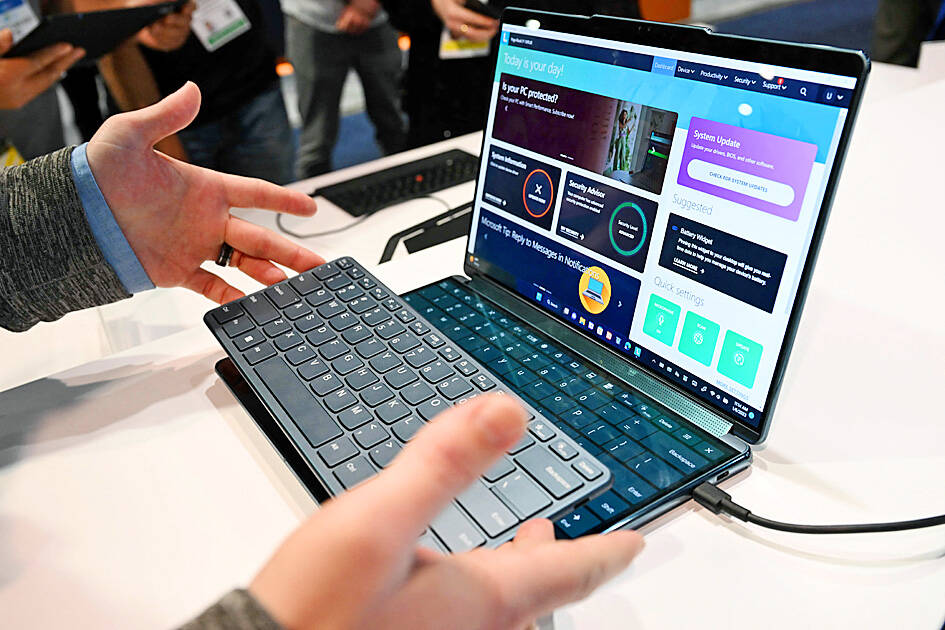Lenovo Group Ltd’s (聯想) profit fell for the first time in almost three years on waning demand for PCs, forcing it to warn of job cuts ahead.
Net income fell for the first time since 2020, after revenue dropped a bigger-than-expected 24 percent to US$15.3 billion in the final quarter of last year, the company said in a statement.
Analysts had expected sales of US$16.4 billion on average.

Photo: AFP
The world’s largest maker of PCs has been struggling with a tumble in global demand following a COVID-19 pandemic-era work-from-home boom.
PC shipments worldwide plunged 28 percent last quarter to 2018 levels, IDC data showed, hurting it and long-time rivals HP Inc and Dell Technologies Inc.
“We think the smart devices market is in its worst period,” Lenovo chief executive officer Yang Yuanqing (楊元慶) said on an earnings call yesterday.
The company will need to make adjustments in its workforce to cut expenses in some operations, while hiring in high-growth areas such as services, Yang said.
He did not provide details on how large the job cuts might be, but said that headcount would be “just a very small portion” of the overall operational cost reduction.
The PC market might stabilize sooner than expected this year, and the company will in the meantime raise efficiency and invest in innovation, Lenovo said.
Such cost cuts helped Lenovo’s quarterly net income fall a smaller-than-expected 32 percent to US$437 million.
“Real demand, reflected by users’ device activations, was much better than industry shipment data,” Yang said.
The market is still working its way through pandemic-era inventory, he said.
“We think the market demand is not as bad as many expected,” he added.
Still, shares of Lenovo extended losses to more than 4.9 percent in Hong Kong yesterday amid their biggest intraday drop in a month.
Softer corporate demand adds pressure on Beijing-based Lenovo’s profitability, as revenue contribution from lucrative services solutions declines, Bloomberg Intelligence analyst Steven Tseng (曾緒良) said.
“Deteriorating enterprise spending amid slowing economic growth and geopolitical tension could be the culprit and the headwind might persist in the near term,” Tseng said in a memo ahead of the earnings release.
In the coming quarters, China’s pledge to spur consumer spending could boost electronics sales.
However, the recovery could be a bumpy one.
While the smartphone market could see a modest recovery this year, PC sales could face more challenges because of lackluster demand from corporations, Tseng and Hong Kong-based Bloomberg analyst Sean Chen said in a separate memo.
“Companies might remain cautious in the near term and tighten spending on digital infrastructure,” they said. “Yet Lenovo could stand out, as it’s poised to be the major beneficiary of China’s localization push to replace foreign-branded PCs in the public sector.”

A proposed 100 percent tariff on chip imports announced by US President Donald Trump could shift more of Taiwan’s semiconductor production overseas, a Taiwan Institute of Economic Research (TIER) researcher said yesterday. Trump’s tariff policy will accelerate the global semiconductor industry’s pace to establish roots in the US, leading to higher supply chain costs and ultimately raising prices of consumer electronics and creating uncertainty for future market demand, Arisa Liu (劉佩真) at the institute’s Taiwan Industry Economics Database said in a telephone interview. Trump’s move signals his intention to "restore the glory of the US semiconductor industry," Liu noted, saying that

On Ireland’s blustery western seaboard, researchers are gleefully flying giant kites — not for fun, but in the hope of generating renewable electricity and sparking a “revolution” in wind energy. “We use a kite to capture the wind and a generator at the bottom of it that captures the power,” said Padraic Doherty of Kitepower, the Dutch firm behind the venture. At its test site in operation since September 2023 near the small town of Bangor Erris, the team transports the vast 60-square-meter kite from a hangar across the lunar-like bogland to a generator. The kite is then attached by a

Foxconn Technology Co (鴻準精密), a metal casing supplier owned by Hon Hai Precision Industry Co (鴻海精密), yesterday announced plans to invest US$1 billion in the US over the next decade as part of its business transformation strategy. The Apple Inc supplier said in a statement that its board approved the investment on Thursday, as part of a transformation strategy focused on precision mold development, smart manufacturing, robotics and advanced automation. The strategy would have a strong emphasis on artificial intelligence (AI), the company added. The company said it aims to build a flexible, intelligent production ecosystem to boost competitiveness and sustainability. Foxconn

Leading Taiwanese bicycle brands Giant Manufacturing Co (巨大機械) and Merida Industry Co (美利達工業) on Sunday said that they have adopted measures to mitigate the impact of the tariff policies of US President Donald Trump’s administration. The US announced at the beginning of this month that it would impose a 20 percent tariff on imported goods made in Taiwan, effective on Thursday last week. The tariff would be added to other pre-existing most-favored-nation duties and industry-specific trade remedy levy, which would bring the overall tariff on Taiwan-made bicycles to between 25.5 percent and 31 percent. However, Giant did not seem too perturbed by the